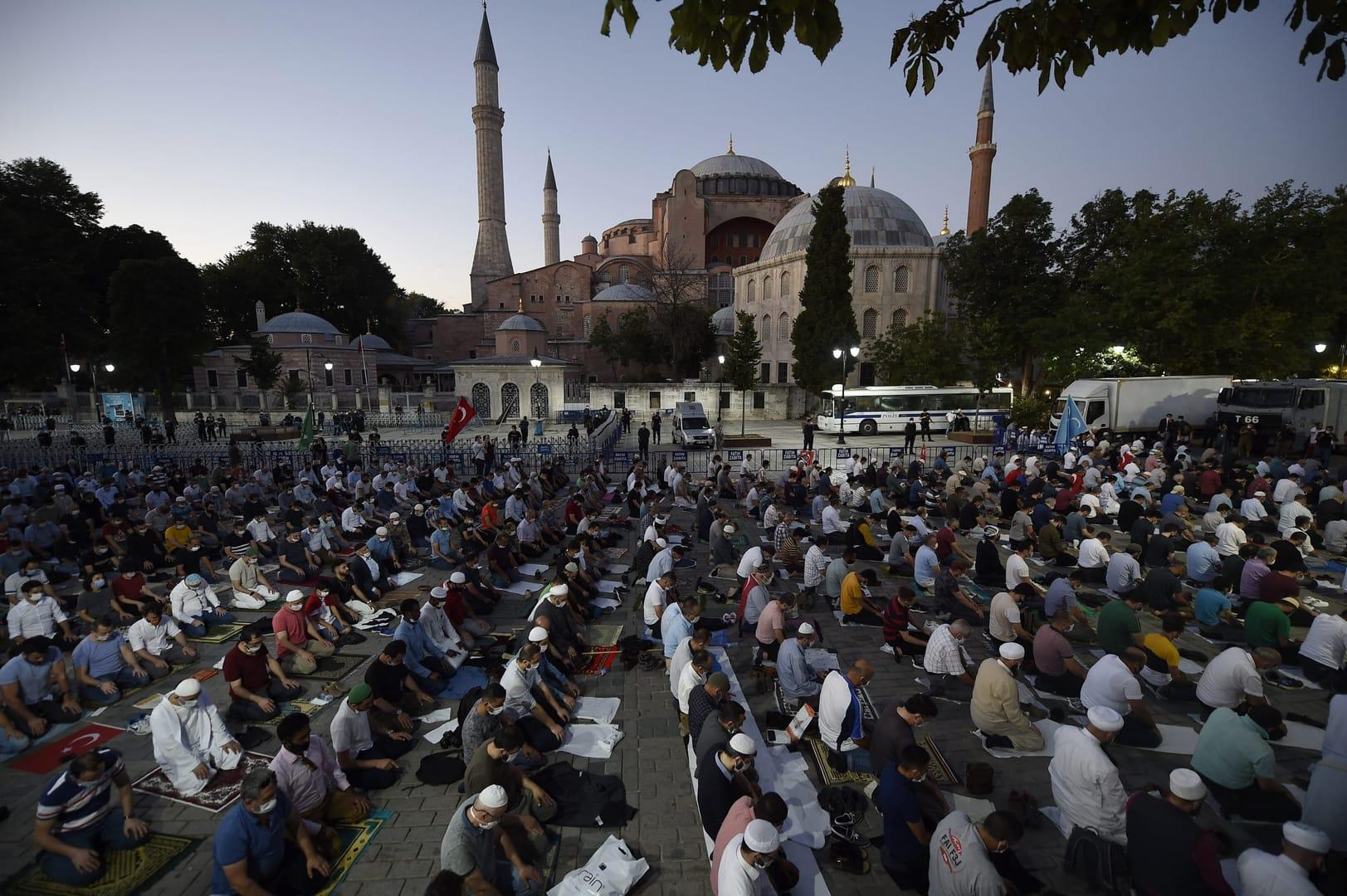ROME – As Muslims chant prayers from Istanbul’s famed Hagia Sophia for the first time 86 years on Friday morning, Orthodox Christians worldwide will recite a hymn of lamentation for what they see as a major blow to interreligious coexistence.
“Our response to the outrage that is being performed today can only come through prayer,” Metropolitan Agathangelos of Fanari, General Director of the Apostolic Ministry of the Church of Greece, said in a statement last week.
“Just as our ancestors and Fathers turned to the Most Holy Theotokos, the Warrior General of our Nation, each time the enemies besieged the walls of (Constantinople), so now we must also recourse there to ask the Virgin Mary with peace in our souls to liberate the temple of the Holy Wisdom of God from all dangers,” he said.
On Friday, July 24, the Hagia Sophia in Turkey, one of the most iconic monuments for both Christianity and Islam, opened its doors as a mosque, something that hasn’t happened since the 1934 decision to convert the structure into a museum.
A UNESCO world heritage site since 1985, the 1,500-year-old Hagia Sophia was built under Byzantine Emperor Justinian and for centuries served as the heart of Eastern Christianity. It was converted into a mosque after the Ottoman Empire’s conquest of Constantinople in 1453.
Ever since Turkey’s Council of Ministers voted to turn the building into a museum, the Hagia Sophia has served as a symbol of unity and neutrality, being open to members of all faiths.
However, on July 10 a Turkish court voted to reverse the 1934 decision, thus ending the monument’s status as a museum and reverting it into a mosque.
RELATED: Turkey reverts Hagia Sophia to mosque despite Orthodox pleas
Even before the decision was announced, the proposal was met with fierce backlash from Orthodox Christians worldwide, with many saying the move was tantamount to a slap in the face for Christians in the east which could have potential political consequences.
During his July 12 Angelus address, Pope Francis said he was “very pained” by the decision, the only comment on the issue the Vatican has made.
RELATED: Pope Francis ‘pained’ by decision to turn Hagia Sophia into mosque
In his July 15 statement, Agathangelos urged members of his church to recite the ancient Akathist Hymn at the same time that Muslims are chanting their first prayers at the Hagia Sophia Friday morning.
A devotional poem or chant dating back to at least the mid-600s, the hymn sings praise to the Virgin Mary and Mother of God, the Theotokos, and was often invoked to protect the city of Constantinople, now Istanbul, from danger. It is commonly chanted in Orthodox churches during the five Fridays in Lent and is considered a spiritual preparation for Holy Week and Easter.
In a July 19 statement, the Greek Orthodox Archdiocese of America joined with Agathangelos’s call, saying the reversion of the Hagia Sophia into a mosque is a “program of cultural and spiritual misappropriation” which consists of “a violation of all standards of religious harmony and mutual respect.”
Signed by Elpidophoros, Archbishop of America, and the metropolitans of Boston, Denver, Atlanta, Detroit, Pittsburgh, San Francisco, New Jersey, and Chicago, the statement declared that July 24 would be observed “as a day of mourning and of manifest grief.”
Urging all Christians and people of goodwill to join in the observance, the bishops asked that “every Church toll its bells in lamentation” on Friday, that flags on church properties be flown at half-mast, and that the Akathist Hymn be chanted in the evening.
“With complete faith in the foreknowledge of our Trinitarian God, and in the divine plan for our salvation, we entrust the future of our beloved Hagia Sophia to His wisdom, and we supplicate she who is the very treasury of that knowledge and the repository of that wisdom to intercede for us…that we may ever do and say that which is pleasing in the sight and in the hearing of her Son, our Lord,” they said.
Despite reopening as a mosque, the monument will remain open free of charge to domestic and foreign visitors who wish to visit.
The 6th-century Byzantine cathedral is considered a work of architectural genius, and nearly 1,000-year-old icons depicting Christ, the Virgin Mary, and Byzantium rulers adorning the massive walls ceilings have been a main attraction – they had been plastered over by the Ottomans when they took over the city, but were uncovered when the Hagia Sophia was converted into a museum.
However, the unique visual of Muslim prayers overlaying a backdrop of ancient Christian icons will not be seen, as the Turkish authorities have announced the images will be covered by a curtain during times of prayer.
In his statement, Agathangelos called the decision to cover the icons “foolish” and “provocative,” insisting that “God allows this insult so that the fall of the abusers is noisy in the history of the world.”
“Through the unity of the faith and devotion to tradition, we will always submit as Orthodox people and as a pious nation to the testimony of the wisdom of God,” he said.
Follow Elise Ann Allen on Twitter: @eliseannallen













